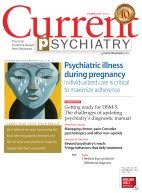Barbara Stuart, PhD, Staff psychologist, Department of psychiatry, University of California, San Francisco, San Francisco, CA
Kate Hardy, ClinPsychD, Postdoctoral fellow, Department of psychiatry, University of California, San Francisco, San Francisco, CA
“I haven’t wanted to call it psychosis yet…”
“I’m not sure if this is psychosis or neurosis.”
“I wonder if there’s a psychotic process underneath all of this?”
“Psychotherapy won’t help psychosis.”
In our experience as practitioners in an early psychosis program, the above statements are common among mental health care providers. In our opinion, they are examples of vestiges of an archaic, overly simplistic clinical language that is not representative of current conceptions of psychosis as being on a continuum with normal experience.
The above quotes speak of psychosis as an all-or-none distinction: a “switch,” something fundamentally different from other psychological processes. In this article, we highlight common “all-or-none” myths about psychosis and argue for a more fluid, normalized psychosis language, where impairment is defined not by the absolute presence or absence of “weirdness” but instead by distress, conviction, preoccupation, and behavioral disturbance. We challenge the notion that the presence of psychosis mandates a “fast track” diagnosis that ignores the complexity of human experience.


No comments:
Post a Comment